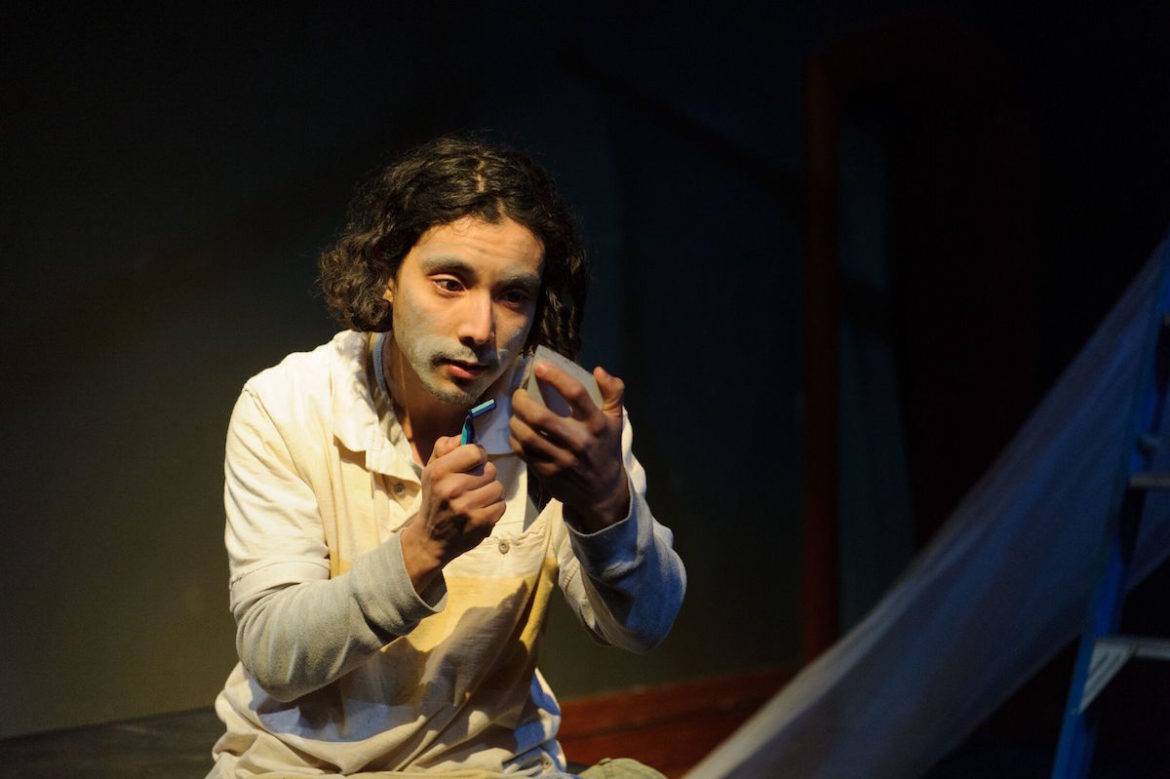‘In this assertion of humanity lingers the spark that becomes revolution’: Robert Reid on Wild Cherries at La Mama
Daniel Keene has been one of Australia’s best known playwrights, both locally and internationally, since the 1980s. His latest work Wild Cherries, now at La Mama’s Carlton Courthouse, is an excellent demonstration of why.
Outside the theatre, waiting under cover with the rest of the audience, the talk around me is about the Australia Council funding cuts. Australian Plays is the latest to announce that they didn’t get through to apply for four year funding, after Theatre Works a few days earlier. The mood is defiant, the air is grim.
Everything reminds me of the ‘90s.
Designer Emily Collett stages the play simply, with three ladders and light cloths draped through the space. The actors all have clay on their faces: dirt from the work, from the floor of the orchard the characters labour in. The clay makes them the same colour as the earth, the same colours as their clothes, their world. Everything is the same: trodden down, washed out, drained of colour. There are echoes of dustbowl America in the ‘30s: the last shades of life, dry and starving.
Soon the workers, seasonal, poorly-paid and disposable, are about to be moved on by their owners. These owners might be a corporation or a family of plantation owners, it’s never made specific. The shadow of bonded labour looms over everything. Because cherries are the crop they pick this season, I keep thinking of the peasants that haunt the un-staged shadows of Chekhov’s The Cherry Orchard. I think of the silent voices whose tragedies are never even mentioned as Ranyevskaya’s family falls apart.
The family running the show in Wild Cherries seems in no danger of falling apart: rather they seem insulated in their enclave of power. The bosses don’t tell the workers anything. The workers are sharing the fragments of information about their immediate futures, the little they can glean from overheard conversations around the camp and up at the house. Only a few of the subservient are invited to the house, and they come under suspicion of siding with the bosses.
These bosses can simply take whatever they want, as is shown when Laura (Molly Broadstock) goes up to the house alone, only to return withdrawn and in shock after being attacked.
Ben Keene’s grinding, pulsing and groaning soundscape haunts each scene, creating an atmosphere of distant industrial machinery or the hot, empty night sky. Anxiety spreads. Movement around the farm is scrutinised. A truck is arriving, there is increased activity everywhere. Whatever is happening to them, the workers guess, will be happening soon.
There is a nowhere-ness to the world Keene and director Beng Oh build, an all-too-near-future where work exists only for the very few. It’s an absurdist emptiness, timeless and spaceless: drained of God and labour and humanity, everything is repetition ground beneath a limited future. There’s no promise beyond the end of the bosses’ contracts, no security, no family except for each other. They’re invisible to the world, as Sonia (Carmellina di Guglielmo) says; but at least they’re visible to each other.
The workers have their own dramas and their own lives. Each has a story of the horrors of displacement which they share with us as monologues. Far from their families, they’re exploited orphans sent from job to job.
A love story between Elena (Lucy Ansell) and Antoni (Enzo Nazario) rapidly becomes a proposal and a rough wedding ceremony, which is conducted by the camp members with their own makeshift rituals. We understand the resistant humanity of these people, who have been ground down, but not into nothing. They join hands to celebrate this love that they all know will imminently be scarred by separation.
But crucially, in this assertion of humanity lingers the spark that becomes revolution. As the end of their days on the orchard draw near, the workers agree not to simply remain voiceless, silently moved on from place to place, separated and let go, but instead to send a message. Together they plan to burn down the orchard at the end of the pick.
It’s a seemingly fruitless gesture, if you’ll pardon the pun, as the trees will be mostly barren now and the work is ending. Still, the flames seem right, even inevitable, as if this is the only way this cruelty can end. In fire.
The torches are doused and lit moments after the wedding is finished. It’s at once a burning of bridges, a pulling up of stumps and a refusal to move on.
Daniel Keene’s voice is as distinctive as always and feels, if anything, even more accomplished. The story and characters are engaging, and the world feels unique but immediately familiar. The hallmark of Keene and Oh’s staging is the evocative and clear compassion for the characters, their compassion for humanity. The performances are all expertly crafted and engrossing.
A sad, dust-filled, twilight world, in which the bare flickers of humanity and love flame against impossible odds.
Wild Cherries, by Daniel Keene. Directed by Beng Oh. Set and Costume by Emily Collett. Lighting by Shane Grant. Sound Design by Ben Keene. Performed by Lucy Ansell, Molly Broadstock, Milijana Čančar, Dennis Coard, Carmelina Di Guglielmo, Kim Ho, Troy Larkin and Enzo Nazario. La Mama Courthouse. Until August 25. Bookings
Wheelchair accessible

